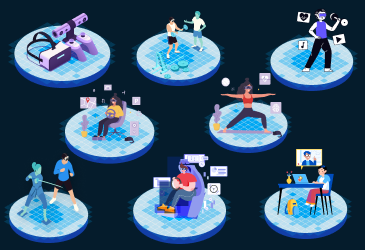In the past few decades, the education sector has undergone significant changes. Matching pace with the rapidly evolving technological sphere, educators have also improved their teaching methods, from word-of-mouth explanations and blackboard drawings/sketches to digital smart classes. Today’s teaching practices aim solely at students’ learning and focus on creating an engaging an immersive environment where they can learn concepts better.
With online learning becoming mainstream, especially after the pandemic, the education sector is now dominantly focused on integrating immersive technologies into academic curricula to make learning fun and engaging. The metaverse is among one such focuses for educationalists across the globe. It aims to involve students in an immersive experience where they can participate in fun activities, making learning more entertaining. Gone are the times when students imagined textbook scenarios through explanations given by their teachers. Today, we are part of a digitally connected world, where concepts like metaverse manifest themselves through real world use cases. In such a scenario, it’s not hard to imagine what transformative outcomes this network of virtual worlds called the metaverse can bring to the global education system. In this insight, we will delve deep into the relation between the metaverse and the education system, and understand how the latter leverages the power of the metaverse.
- What is the metaverse?
- Metaverse’s applications in education
- How can different subjects make use of the metaverse?
- Benefits of the metaverse in education
What is the metaverse?
The metaverse is a three-dimensional virtual world that integrates aspects of online gaming, social media, virtual reality (VR) and augmented reality (AR) to create a space where users can interact virtually. It is a persistent, always active, real-time ecosystem that overcomes the limitations of geographical boundaries to offer valuable services to users.
This massive virtual universe can offer you services in a way impossible in the real world. It offers a space for gaming, socializing, entertainment, learning, working and various business opportunities.
Metaverse’s applications in education
The education sector can leverage the benefits of the metaverse in several ways, which are:
Virtual 3D classrooms
With the emergence of online schools and colleges, students have begun to experience a gap between immersive physical classrooms and virtual ones. The metaverse can bridge this gap by creating 3D virtual classrooms where students can virtually meet and interact with their classmates and teachers. Students from any geographical location can be a part of this metaverse-powered learning setup and do much beyond what a physical classroom allows.
Digital learning
When smart classes were added to school education curricula, they enhanced students’ learning with video projection on various subject topics. The metaverse aims to make these classrooms a notch smarter by allowing students to fully immerse in such videos, helping them experience all the content more closely. Moreover, it provides a space for them to experiment, fail and learn from their failures in subjects that require practical experiments. Even physical classes can use such 3D virtual learning to achieve desired learning outcomes.
Virtual campus activities
The metaverse allows students to take part in extra-curricular activities like sports and arts in a virtual setup. Students can undertake various fun activities like engaging in music or mathematics club, similar to physical campus activities. They can also walk around their virtual campus right from the comfort of their home.
Interdisciplinary learning
The metaverse has the potential to break down barriers between subjects and promote interdisciplinary learning. It enables teachers to merge traditionally discreet subjects like mathematics and science, offering an engaging and holistic learning experience while demonstrating the real-life applications of various theories.
Creating simulating real-life situations
Learning in the metaverse proves productive, primarily because this virtual space can engage students by replicating real-life situations where they can conduct scientific experiments, showcase prototypes and even enter a documentary video, say on World War I. In the future, we might witness subject-specific 3D spaces created to assist students’ learning while helping teachers better explain the subject content.
Bringing awareness
The metaverse can be used in classrooms to build awareness in social issues such as famine, pollution or climate change to awaken the humanitarian interests of children. Students, for instance, can be shown a documentary on famine in Somalia or poverty in Burundi to help them analyze how it affects the people living there. With such a teaching approach, students will not just take home theoretical knowledge but also a deep emotional understanding of things happening around them.
Virtual tours
Imagine reading about a country or a place in the classroom and then immediately traveling to that place. Wouldn’t it be an amazing experience? Although it is not feasible in the real-world, the metaverse allows such possibilities by offering virtual worldwide tours. By allowing students to travel to any place of their choice in a virtual setting within minutes, the metaverse helps expand their horizons and broaden their worldviews.
Events and people
Educators can invite prominent figures or people of wisdom and knowledge in the virtual world of the metaverse to help students learn about their various life experiences. They can attend engaging symposiums, conferences and lectures. Various events like exhibitions and fests can also be conducted to help them refresh their minds.
Comprehensive development services to help you lead the future-ready Metaverse projects.
Launch your metaverse project with LeewayHertz
How can different subjects make use of the metaverse?
- History – Any specific historical era can be recreated in a metaverse, where students can go and learn about it in an immersive way. For instance, students can witness the French Revolution as though it is happening live.
- Geography – Geography and Astronomy students can explore the solar system or different layers of the earth or the constellations through the hyper-realistic visual experience offered by a metaverse.
- Science – Metaverse facilitates laboratory activities, allowing students to experiment in a virtual setup. For instance, they can dissect a virtual cockroach to learn the anatomy of insects or conduct experiments on Newton’s weight, mass and gravity and other important concepts.
- Art – Students can closely analyze paintings by famous artists within the metaverse and feel inspired to create their own digital artwork.
- Literature – In a metaverse, a novel or a story can be recreated where students can enter and watch the scenes as they unfold, helping them understand the story and relate to the characters better.
Benefits of the metaverse in education
An immersive learning experience
Education through metaverse can engage students in a 3D world of imagination where they can view and interact with their peers and the 3D objects around them, just like in a physical classroom. Whether it is about the prehistoric stone age or the modern age, metaverse learning can virtually transport students to various historical periods, eliminating the need for imagination. Wouldn’t it be amazing to learn about the voyages of Columbus by sailing on his ship and discovering the 15th-century America?
Gamification
Although students can be taught statically or passively and actively in an engaging way, the latter is the most effective as it can teach concepts better. Metaverse does the same for students through gamification, which is the process of integrating something with game elements to encourage user participation. Gamification in a metaverse combines both entertainment and learning to increase student participation and engagement where they have to complete fun tasks. This motivates students to keep learning and finish their assignments on time.
Hands-on practice
The metaverse is redefining the conventional means of education by engaging students in hands-on practices, which can otherwise be risky and difficult to do in a real-world setting. It helps students better understand theories and refine their skills to prepare them for real-life endeavors. Students can do complex surgeries or conduct unsafe explosive experiments within a metaverse without putting someone’s life on the line.
Life-like learning
Unlike the conventional education system that hardly promotes active communication and engagement among students, metaverse classrooms offer life-like ecosystems that motivate students to interact with their surroundings and peers. In a metaverse, educators can take students to various life-like scenarios where they can participate in activities after which they can discuss their learnings and findings.
Improved learning speed
According to a research conducted by PwC, employees in VR-enabled courses learned four times faster than in the classroom environment. The metaverse’s immersive experience brought on by gamification, engrossing hands-on practices, 3D elements and fun activities can keep learners a step ahead. Moreover, metaverse learners feel less distracted, as they can comprehend subject topics better through 3D simulations that completely engage an individual’s vision and attention.
Endnote: The future of the metaverse in education
The term metaverse has been able to draw massive attention ever since Facebook was rebranded to Meta. It has stoked the interest of top brands and businesses that have already started investing in several metaverse projects. Although the concept of metaverse is also creeping into the academic field, its possibilities in the education sector are yet to be unlocked fully. Meta, investing $150 million through Meta Immersive Learning to grow students’ access to learning through technology, and several startups and prominent schools exploring the possibilities of the metaverse education are a hope for the future. With its innumerable benefits, the metaverse will undoubtedly revamp the education system, accelerate learning and restructure the existing system into a more advanced, innovative and relevant one.
If you are looking to build or optimize a metaverse virtual world, we are happy to discuss your project requirements. Please connect with our metaverse experts to discuss more.
Start a conversation by filling the form
All information will be kept confidential.
Insights
Metaverse Training: Future of Learning & Development
The disruptive innovation of metaverse mixed-reality learning environments can dramatically improve training, development and real learning.
Top 10 Metaverse Development Companies
Metaverse is the buzzword of this decade. Discover the best development companies that are assisting businesses in developing metaverse projects in 2024.
How much does it cost to build Metaverse?
Metaverse virtual world cost estimation varies based on metaverse features and user requirements changes.











